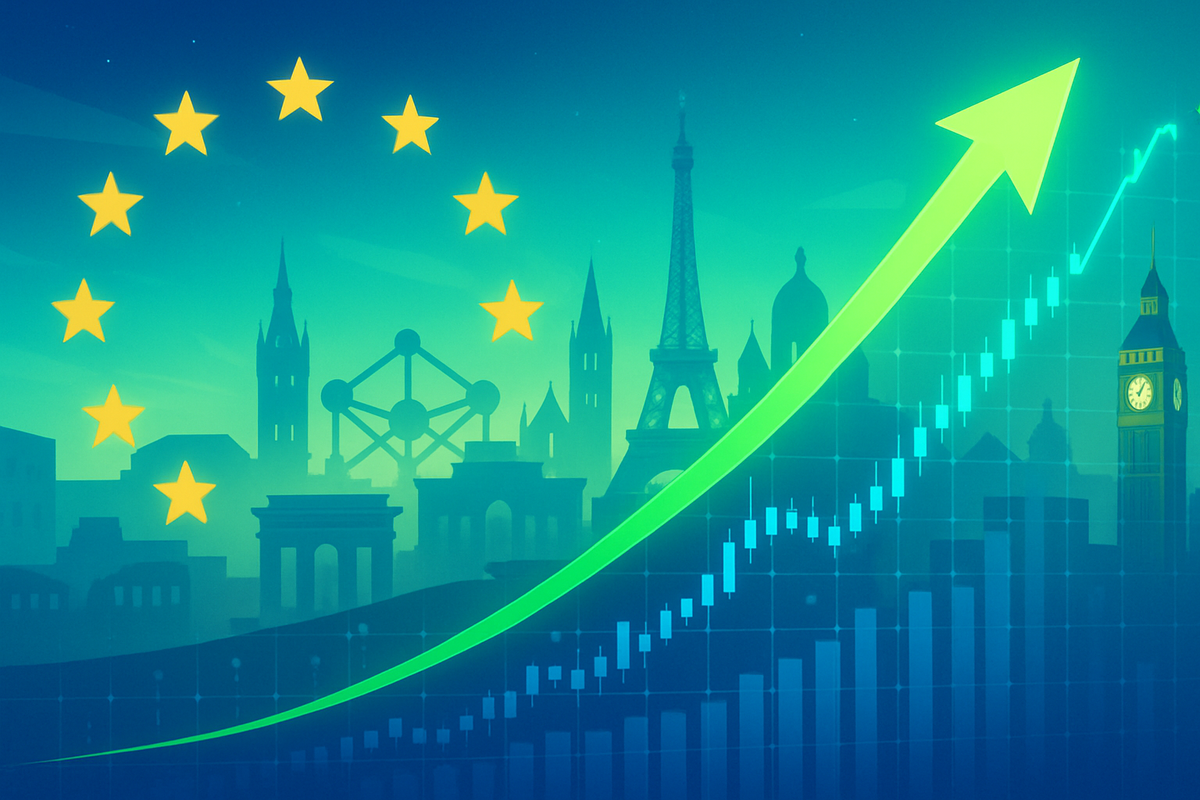
European stock markets are experiencing a robust rebound today, October 20, 2025, as a wave of optimism regarding international trade negotiations sweeps across the continent. This positive sentiment has ignited a significant rally, pulling major indices out of a recent slump, with the benchmark FTSE 100 (LSE: UKX) leading the charge and showcasing renewed investor confidence in the global economic outlook. The sudden shift in mood follows a period of heightened trade tensions and market uncertainty, offering a much-needed respite for investors.
The immediate implication of this resurgence is a broad-based uplift in asset values, signaling a potential turning point after a series of challenging sessions. Companies heavily exposed to international trade, manufacturing, and export sectors are seeing particular gains, as the prospect of eased tariffs and improved global supply chain fluidity becomes more tangible. This market reaction underscores the profound impact that geopolitical developments and trade relations have on financial stability and investor behavior.
A Glimmer of Hope: Trade Talks Fuel Market Ascent
The catalyst for today's significant market upswing appears to be breakthroughs in ongoing, high-stakes trade discussions. While specific details remain under wraps, unofficial reports and positive statements from key negotiators suggest substantial progress toward de-escalating trade disputes that have weighed heavily on global markets for months. This development has effectively reversed the pessimistic trend that dominated recent trading, which saw major European indices, including the German DAX (XTRA: GDAXI) and French CAC 40 (EPA: PX1), suffer considerable losses.
The timeline leading to this moment has been characterized by a cyclical pattern of escalating rhetoric, imposition of duties, and subsequent attempts at dialogue. The recent sell-off, which preceded today's rally, was largely attributed to fears of a deepening trade war, threatening corporate earnings and global economic growth. Key players involved in these negotiations include representatives from the European Union, the United Kingdom, and major Asian economies, all striving to forge agreements that promote fair trade and economic stability. The initial market reaction has been overwhelmingly positive, with significant buying activity observed across various sectors as investors reposition themselves to capitalize on the improved trade landscape.
Corporate Beneficiaries and Potential Underperformers
The renewed trade optimism is poised to create clear winners and losers among public companies. Exporters and multinational corporations with extensive global supply chains are likely to be the primary beneficiaries. Companies like Airbus (EPA: AIR), a major aerospace manufacturer, and luxury goods conglomerate LVMH (EPA: MC), which relies heavily on international sales, stand to gain significantly from reduced trade barriers and improved market access. Similarly, industrial giants such as Siemens (XTRA: SIE) and automotive manufacturers like Volkswagen (XTRA: VOW3) could see their profit margins improve as tariffs decrease and the cost of raw materials and components stabilizes.
Conversely, companies with a predominantly domestic focus or those operating in highly regulated, non-trade-dependent sectors might see less direct impact from this specific development. While the overall market sentiment benefits them indirectly, their core business drivers remain largely unchanged. Furthermore, companies that thrived during periods of protectionism or those that have heavily invested in reshoring supply chains might experience a slight competitive disadvantage if global trade becomes significantly freer and more efficient. Investors will be closely watching for corporate earnings reports in the coming quarters to gauge the tangible effects of these trade developments on company performance.
Broader Implications: A Shift in Global Economic Dynamics
This market rebound, driven by trade optimism, signifies more than just a momentary uplift; it represents a potential shift in broader industry trends. A sustained period of trade de-escalation could reinvigorate globalization, encouraging cross-border investments and fostering greater economic interdependence. This contrasts sharply with recent trends towards protectionism and regionalization. The ripple effects could be profound, impacting not only direct trade partners but also global logistics companies, shipping firms, and technology providers that facilitate international commerce.
Regulatory and policy implications are also significant. A more stable trade environment might reduce the impetus for new tariffs or trade barriers, potentially leading to a review of existing protectionist measures. Historically, periods of trade liberalization have been associated with increased economic growth and innovation, while trade wars have often led to recessions and market instability. This event could be compared to previous instances where major trade agreements (e.g., NAFTA, WTO accession) sparked similar waves of investor confidence, though the current geopolitical landscape adds unique complexities.
The Path Ahead: Navigating a Cautiously Optimistic Future
Looking ahead, the short-term outlook suggests continued market volatility as investors scrutinize the actual implementation of any trade agreements. While optimism is high, the market will demand concrete evidence of progress, such as the signing of formal pacts and the repeal of tariffs. In the long term, sustained trade peace could unlock significant economic growth potential, foster greater international cooperation, and lead to more resilient global supply chains. However, any renewed tensions or breakdowns in negotiations could quickly reverse today's gains.
Companies may need to strategically pivot, perhaps re-evaluating their supply chain diversification efforts, expanding into previously challenging markets, or increasing investment in R&D to capitalize on new global opportunities. Market opportunities could emerge in sectors that benefit most from open trade, such as technology, industrials, and consumer discretionary goods. Challenges might include increased competition from foreign entities or the need to adapt to evolving international trade standards. Potential scenarios range from a full-blown return to trade liberalization to a fragile, temporary truce, each carrying distinct implications for investors.
A Pivotal Moment for European Markets
Today's European stock market rebound, propelled by renewed trade optimism and the strong participation of the FTSE 100 (LSE: UKX), marks a pivotal moment for investors. It underscores the profound influence of international relations on financial markets and the resilience of investor sentiment when faced with positive geopolitical developments. The key takeaway is that a significant hurdle for global economic stability—trade uncertainty—appears to be diminishing, at least for now.
Moving forward, the market will be keenly watching for concrete actions and official announcements related to the trade negotiations. Investors should pay close attention to the details of any agreements, the reactions of major economic blocs, and the subsequent impact on corporate earnings. While the immediate outlook is positive, the path to sustained global trade harmony is often complex and fraught with potential setbacks. Vigilance and a nuanced understanding of geopolitical developments will be paramount for navigating the months ahead.
This content is intended for informational purposes only and is not financial advice





